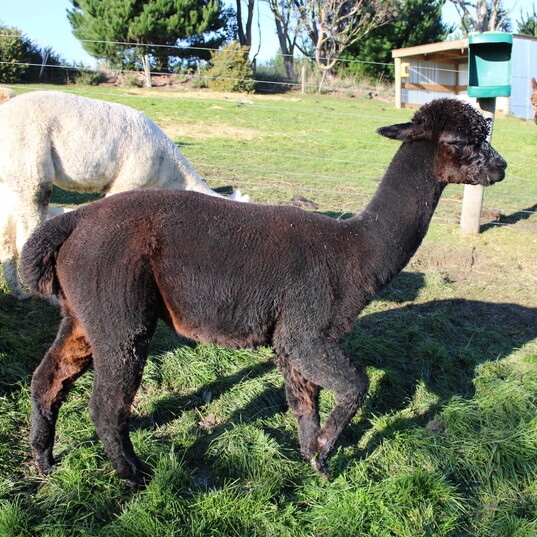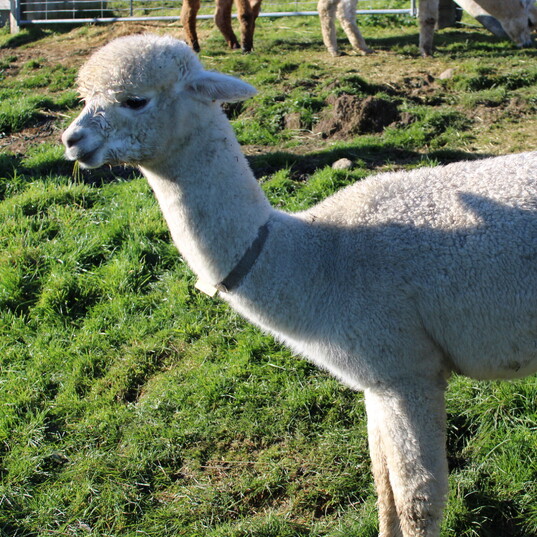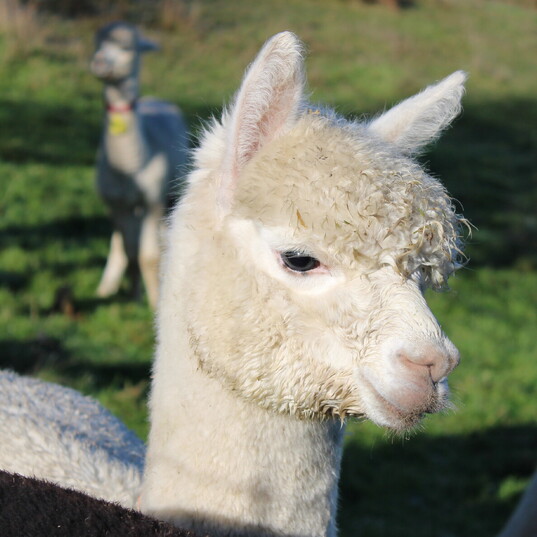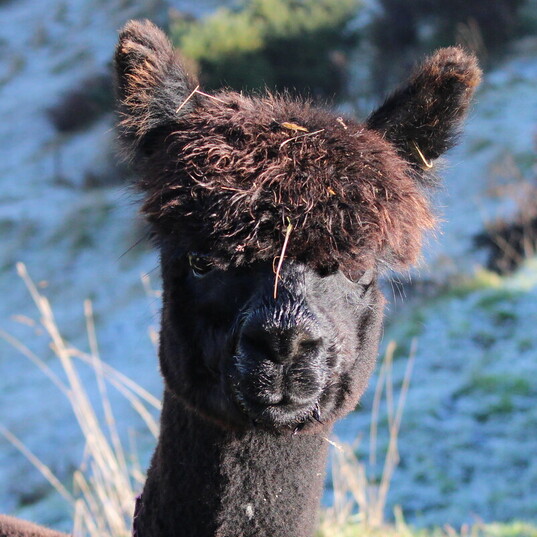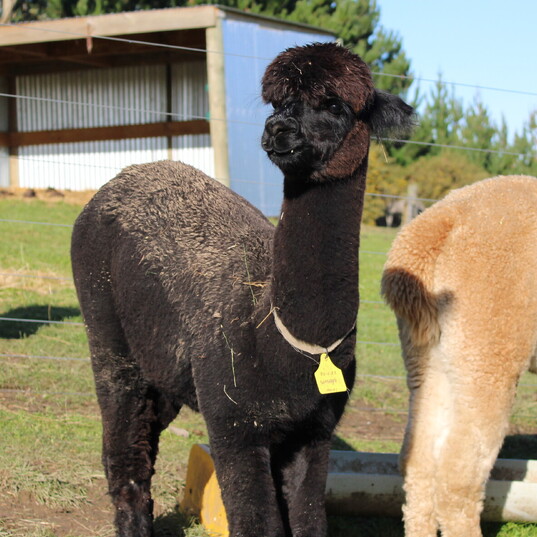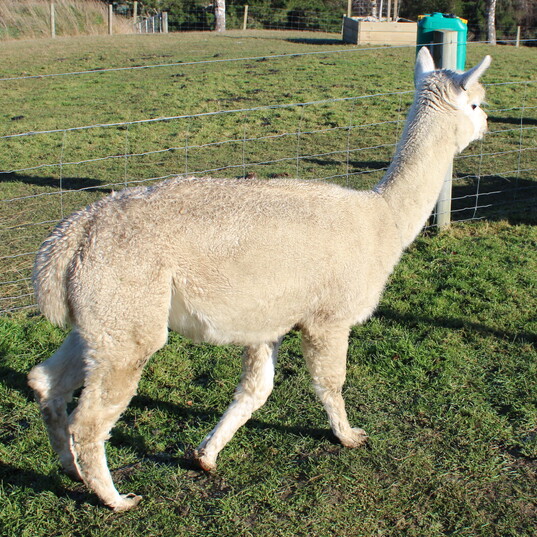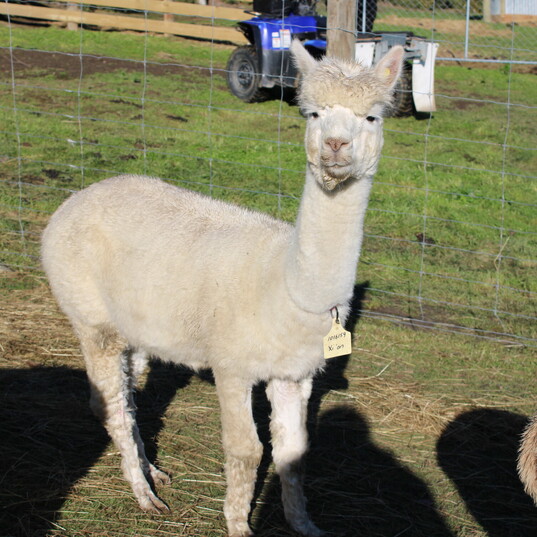ALPACAS
FOR SALE
A WONDERFUL ADDITION
Bruce Farm alpacas make the greatest addition to your farm or lifestyle block with gentle temperaments and soft padded feet, so kind to your land.
Alpaca Boys for Sale
Bronson
Entire Male - Potential Stud
All of our boys are kept entire, we can sell entire, or we can arrange for the castration of your chosen alpaca at an extra cost.
DOB 31/3/2019
Price $500.00
View NZ Alpaca Registry Details IAR 1020167
Bryan
Entire Male
All of our boys are kept entire, we can sell entire, or we can arrange for the castration of your chosen alpaca at an extra cost.
DOB 18/02/2022
Price $300.00
View NZ Alpaca Registry Details IAR 1025979
Muzza
Entire Male - POTENTIAL STUD
All of our boys are kept entire, we can sell entire, or we can arrange for the castration of your chosen alpaca at an extra cost.
DOB 02/02/2022
View NZ Alpaca Registry Details IAR 1025980
Price $500.00
Umaga & Muzza are best friends, and it would be ideal if they went to a home together.
Umaga
Entire Male
All of our boys are kept entire, we can sell entire, or we can arrange for the castration of your chosen alpaca at an extra cost.
DOB 20/01/2022
View NZ Alpaca Registry Details IAR 1025978
Price $300.00
Umaga & Muzza are best friends, and it would be ideal if they went to a home together.
Salvador
Entire Male
All of our boys are kept entire, we can sell entire, or we can arrange for the castration of your chosen alpaca at an extra cost.
DOB 04/02/2021
Price $300.00
View NZ Alpaca Registry Details IAR 1022757
Alpaca Girls for Sale
Alpaca females are priced between $1500.00 - $2500.00.
Please contact us to discuss packages, pricing and options.
Elizabet
Female
DOB 05/02/2017
Price POA
View NZ Alpaca Registry Details IAR 1019497
Elizabet was mated on 21/2 to 25/2/23 to Rigel (IAR 1005333) Final spit off 8/11/23. Confirmed Pregnant. Approx birthing day 27/1/24
Fliss
Female
DOB 14/02/2014
Price POA
View NZ Alpaca Registry Details IAR 1009729
Elizabet was mated on 21/2 to 25/2/23 to Rigel (IAR 1005333) Final spit off 8/11/23. Confirmed pregnant. Approx birthing date 27/1/24
Vilma
Female
DOB 21/12/2012
Price POA
View NZ Alpaca Registry Details IAR 1021423
Vilma was not mated this year, but would make an excellent companion animal for another alpaca, and we could look at a package for her.
Violet
Female
DOB 22/01/2017
Price POA
View NZ Alpaca Registry Details IAR 1017626
Remy was mated on 08/02/2023 to 12/02/2023 to Grabezzi (IAR 218044) Final spit 8/11/23. Confirmed pregnant. Approx birthing date 14/1/24
X'ian
Female
DOB 18/02/2016
Price POA
View NZ Alpaca Registry Details IAR 1016159
Remy was mated on 21/02/2023 to 25/02/2023 to Rigel (IAR 1005333) Final spit off 8/11/23. Confirmed pregnant. Approx birthing date 27/1/24
WHY ALPACAS
Ideal Fleece
Alpaca fleece is a versatile, warm, strong, water resistant fiber. They produce fibre that is as fine as cashmere, soft, silky and warmer and stronger than sheep's wool.
Ideal for Cross Grazing
Cross grazing of the paddocks with other livestock is effective in controlling worm numbers as cross-species are not susceptible to the worms carried by alpaca and vice versa.
Ideal for Lifestyle Blocks
Alpacas are clean and intelligent, easy keepers that are light on the land, having soft padded feet with toes rather than hooves.
READY FOR YOUR OWN ALPACA?
ALPACA CARE INFO
GRAZING
Alpacas are browsers rather than grazers. They thrive on a low protein high fibre diet. A maximum of 14% protein in the diet is recommended. They also like meadow hay and silage. The recommended stocking rates is 5-8 alpacas to the acre, depending on the quality of pasture.
HYGIENE
Alpacas are ruminants with three stomachs; they converts grass and hay to energy very efficiently, eating far less (as a percentage of its body weight) than other farm animals.
Alpacas are very tidy animals. They normally defecate in one place, sometimes walking a distance to do this. Alpaca herds consolidate their waste in one or two spots in the pasture, controlling the spread of parasites and making it easier to collect and compost their fertilizer.
FENCING
Alpacas will rarely challenge a fence, but whatever fencing you do have must be sufficient to keep predators out, particularly stray dogs. A 5 or 6 foot boundary fence or deer fence is suitable for external fencing. Sheep fences are suitable for internal fencing.
MANURE
Alpaca manure is lower in organic matter content than most other livestock but still has enough to improve soil texture and water-holding capacity. This decomposition of organic matter indicates their efficient digestion system.
The alpaca's rich fertilizer is perfect for growing fruits and vegetables. The lower organic content allows alpaca manure to be spread directly onto plants without burning them.
SHELTER
Alpaca do not normally seek shelter, if you have trees as wind breaks; this is mostly all they need. Their fibre provides excellent insulation and protection from the cold.
SHEARING
Shearing should be done once a year in the spring or early summer .This also allows them to remain cool during the hot summer months and grow sufficient fleece for protection against the winter cold.
The fleece from shearing one year's growth will normally weigh about 3kg to 5kg per alpaca.
HEALTH CARE INFO
Most of the health care alpacas require can be done if you have previous livestock experience.
IMMUNISATION
Adult alpacas should be vaccinated twice a year. A normal sheep vaccine of the 5-in-one type provides sufficient immunity from clostridial diseases (Pulpy kidney, Tetanus, Black Disease, Malignant Oedema, and Blackleg.)
Cria's should be vaccinated at 4 - 6 weeks of age when the immunity they receive from their mother is no longer effective.
WORMING + TRIMMING
Deworming normally twice a year maybe more depending on the environment they are running under with Ivermectin.
Toe nail and teeth trimming is normally done every 3-4 months.
TB testing is voluntary – however in the interest of good animal health practice it is recommended.
RYE-GRASS STAGGERS
First signs are a perceptible tremor of the head and neck followed by unstable gait. Remove the animal from the infected pasture immediately. Feed Lucerne of good quality. Mycosorb can help to absorb the toxins in the digestive system.
BREEDING
BREEDING
Female alpacas are mature enough to breed around 12 to 16 months old, but can wait until approaching 2 years of age. Females don't cycle, or season, rather, they are induced ovulators, meaning the eggs of the female are released in response to mating. During their life time females can produce 15 or more Cria.
GESTATION & BIRTH
Gestation is around 340 days. Remating is best 14 to 18 days after giving birth. Because they are from cold climates, most alpaca births occur during the day and are uncomplicated. Cria are normally weaned at 6 to 7 months of age.
CASTRATION
The males are usually sexually mature at 2 to 2½ years of age sometimes as young as 1½ years. Males not required for stud can be castrated around 1 year of age – these animals make wonderful pets and fibre producers.
DID YOU KNOW?
Alpacas breed once a each year.
The gestation period lasts from 242 to 345 days, roughly 11 months.
They only carry one offspring at a time.
Cria are born in NZ from December until March.
Because they are from cold climates, most alpaca births occur during the day and are uncomplicated.
Cria are normally weaned at 6 to 7 months of age.
During their life time females can produce 15 or more Cria
Bruce Farm Alpaca Stud
Kim & Katee Palin
t/a Bruce Farm Alpaca Stud
54 Pillans Road, Hillend RD 4
Balclutha 9274
P: 027 555 0796
E: brucefarm.alpacas@gmail.com
Opening Hours
Monday | Closed | |
Tuesday | Closed | |
Wednesday | 11am - 3pm | |
Thursday | 11am - 3pm | |
Friday | 11am - 3pm | |
Saturday | 11am - 3pm | |
Sunday | 11am - 3pm |
FARM TOUR TERMS & CONDITIONS
Please note, Bruce Farm is a working farm, and as such there are health & safety procedures that must be followed.
Bruce Farm Alpaca Stud is a working farm, there may be movement of vehicles and animals during your visit.
Follow instructions from your guide.
Do not enter paddocks without guide directions.
Wear appropriate footwear, you will be walking though grass lanes.
Hazards do exist, do not leave your tour party and wander on your own.
Young children are to be under adult supervision at all times.
Do not feed animals, guide will supply correct foods.
Bruce Farm Alpaca Stud takes no responsibility for loss or damage to your personal property.
